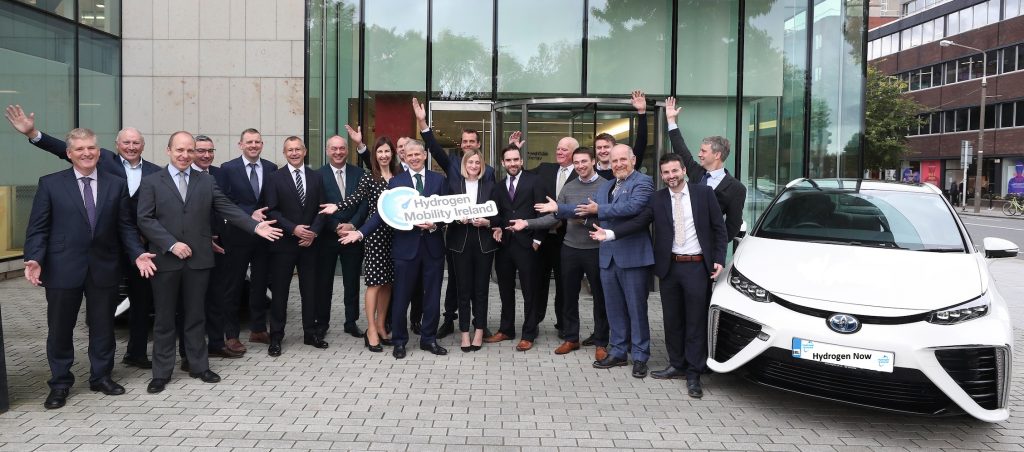Working on the development of environmental projects can be a bit like working back-stage in the build-up to a big spectacular stage event. Much of the excitement and the interest of expectant observers will be focused on something to be delivered complete, fully functional and beyond expectations …. on some future day that can’t come quickly enough. Backstage there is little to see other than frantic, repetitive, dull, often boring tasks and very often focused on safety issues. So, few people tend to be particularly interested in this behind-the-scenes work “but then it is the few that matter” to quote Dylan Thomas. Hydrogen Mobility Ireland’s (HMI) work to deliver Hydrogen as a secure, renewable, green, affordable and normalised mobility option is currently in this back-stage phase, well out of the spotlight but seeking to ensure that it will be more than alright on the night when the vehicles start rolling on our streets.
HMI was founded in 2019 and in October launched, A Hydrogen Roadmap for Irish Transport, outlining not only the contribution that hydrogen can make to reducing transport emissions but how it might be delivered. Since October the Group of very driven (pardon the pun) organisations, committed to delivering on this Roadmap have been working on how we can make that transition from theoretical planning into developing the practical steps and actually delivering the project. The key challenge in this for all of the partners is the need for a choreographed roll-out where all components need to be in place and operating at the same time.
Unlike Battery Electric Vehicles (BEV), a buyer taking delivery of a Hydrogen Fuel Cell Vehicle (HFCV) doesn’t have the option of plugging-in at home, at work or elsewhere. What they need is a refuelling network so they can gain the easy refuelling benefits of the vehicle. That means Hydrogen refuelling stations need to be in place and Hydrogen Production facilities need to be producing and supplying hydrogen to these stations. It is a classic example of mutual dependency; vehicle buyers need refuelling stations and production in place, refuelling stations need Producers and vehicles in place and Producers need both refuelling stations and vehicles to be in place. The “HMI Project” is about delivering each of the pieces with a view to being ready at the same time. Not an easy or simple thing but a very interesting and exciting challenge.
The Group has been focused in its work on business structures based on projected volumes of vehicles, Hydrogen usage and potential Production and Refuelling locations as well as information on available vehicle types and on costs, budgeting, funding and the potential benefits to the end-user customer and to the Environment. This is the back-of-house work that will excite only the most committed of champions for the project but it is key to building and delivering what is required.
The arrival of Covid-19, with all its restrictions, has obviously had an impact but through distance-working and virtual-meetings we have, like the rest of the economy, managed to keep the project on track. Of course Covid-19 will have a huge impact on State finances and of course large environmental projects such as ours necessarily rely fairly heavily on levels of State supports, in their early stages when costs tend to be very high and commercial income very low. And yet this pandemic has prompted many commentators to observe that we may not wish to go back to what we did before. In a post-pandemic world there is likely to be even stronger support to drive for greater progress on the environment and at a quicker pace. In the current Government formation talks we have seen discussions centre on whether annual CO2 savings of 7% can be achieved; with the help of green hydrogen possibly it can be…
The HMI group has also been focused on the increasing commitment of more vehicle manufacturers to deliver an increasing range of vehicles into the market over the next few years, intent on ensuring that Ireland can capture a good initial share of such vehicles, as they become available, to ensure that we can deliver benefits at an early stage in this game-changing transition to a greener transport sector. Indeed a first sight of Hydrogen Fuel Cell Vehicles operating on the road in Ireland had been planned for this year, with two separate trials involving a number of buses on routes in the greater Dublin area. As with every other aspect of life, Covid-19 considerations have impacted on the practical delivery of this and the dates will have to change somewhat. So instead of being able to announce the exact date of the first hydrogen bus trial, keep watching news updates and we will keep you updated through Hydrogen Ireland also.
Of course we will only see these vehicles operating commercially on the road when we have Hydrogen production running and a network of refuelling stations in place to service them. The HMI implementation project is currently in development with a phased spread of refuelling from an initial cluster of stations in the Dublin area, followed by a presence in the other major cities and the larger towns and intermediate locations. The strategy is based on ‘normalising’ this fuel as quickly as possible by replicating the type of refuelling coverage that exists for fossil fuel vehicles. While all of this may sound ambitious, the current aim is to see each of these phases as a three year process so that from the first stations in place from 2022 we should see a national network operating by 2028. If we can deliver on all of this within that planned timescale, a future of green transport is within touching distance. In the meantime we will continue with our back-stage preparations for that future grand opening.
Alan Nolan, HMI





